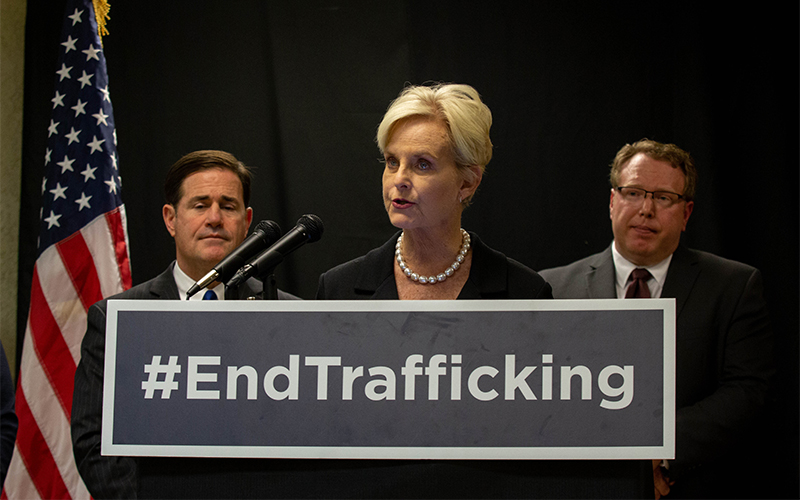PHOENIX – After her first experience of being trafficked for sex at 18, Megan went home and scrubbed her skin so hard she began to bleed.
“I was so disgusted,” she recalled.
At least three times a day, for the next four years, the man she called her boyfriend would sell her for sex – as if she had a quota to meet.
Thrusting a needle full of heroin in her arm became necessary to function: “It was a matter of getting myself to be able to move,” she said.
Megan, 23, is now in the care of the Phoenix Dream Center, a nonprofit that cares for former sex-trafficking victims.
On Wednesday at the Dream Center, Gov. Doug Ducey and Cindy McCain, co-chairs of the Arizona Human Trafficking Council, discussed their work to slow human trafficking and work with victims like Megan. Cronkite News does not identify victims of sexual abuse.
Megan, who said she hasn’t used heroin for four months, plans to enroll in school and eventually become a math teacher. She wore a T-shirt reading “Straight Outta Hope Wing,” the fabric matching her ivory-polished nails.
The Dream Center has helped more than 1,500 children and young adults affected by human trafficking, according to its website.
As a border state, Arizona is a major hub for human trafficking around the world, according to trustaz.org. According to the Arizona Human Trafficking Council, less than 2 percent of human trafficking victims are ever identified.
The council said the average age in Arizona to enter sex trafficking is 14.
McCain said her battle against human traffic started years ago, when she shopped for sari fabric for her daughter in Kolkata, India. She heard clattering from beneath the store’s floorboards. The shopkeeper told her the noise was from his family that lived below.
She looked down, peering through the floorboards.
“I saw 100 sets of eyes – and they were little girls.”
McCain remembers what happened next.
“What did I do?” she asked.
“I did nothing.”
McCain went back to her nice home and lovely family. But she later turned the memory into a cause.
The council has trained 31,000 people – first responders, counselors, nurses, and juvenile probation officers – since 2014 to spot signs of human trafficking, according to a 2018 report.
McCain said educating law enforcement officers can turn their focus from treating human trafficking victims as criminals to providing help. The council will expand the training to rural Arizona, where resources are limited.
Follow us on Instagram.
